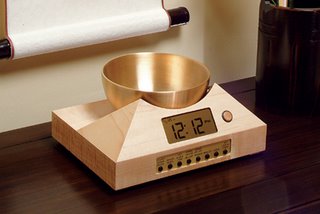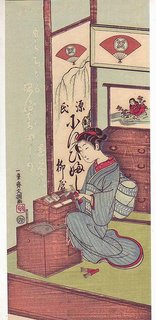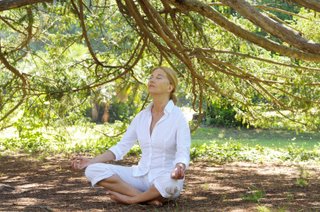|
 Secure Site
Secure Site
|
 |
Archive for the 'Natural Awakening' Category
 Gentler-Rousing Alarm Clocks Get a Zen start to the day with this unique clock that has an acoustic chime to gradually ring you out of bed. Some testers found the chimes too subtle, so if you are a heavy sleeper this is not for you. The clock and chime sit in a small wooden box that can be easily stowed away. Also has battery backup. (now-zen.com)
Adapted from Good Housekeeping: Read more: Gentle Alarm Clocks – Good Housekeeping
Now & Zen
1638 Pearl St.
Boulder, CO 80302
 peaceful wake up clock
Posted in Bamboo Chime Clocks, Natural Awakening, wake up alarm clock
 stillness practice By Sherri Silverman
The Power of Meditation
Meditation and other spiritual practices are basic to enhancing energy—they create balance and improve the quality of your home or office. In fact, the best thing you can do besides building according to Vastu to improve the supportiveness of a space is to do spiritual practices (sadhana). Prayer, meditation, yoga, chanting, and pranayama all enliven a space.
Be consistent with the spiritual practices of whatever tradition you are drawn to. As the Sufi poet Rumi said, your true home is within and reachable by letting go and allowing the mind to go inward. When we feel at home within ourselves and within our own hearts, any building we live in will feel more serene and supportive. Meditation practices make us more perceptive of our environment, so that we intuitively know many of the changes to make. We become more in touch, literally and metaphorically. According to Vastu, the northeast or the center of the home is the best area for meditation rooms, spiritual altars, and yogic practices.
Vastu expert Sherri Silverman, PhD, is the founder of Transcendence Design. This article is adapted fromVastu: Transcenden-tal Home Design in Harmony with Nature by Sherri Silverman. © 2007 by Sherri Silverman. Reprinted with permission of Gibbs Smith.
 Meditation Tools and Timers with Bowl Gong Now & Zen
1638 Pearl St.
Boulder, CO 80302
(800) 779-6383
Posted in Chime Alarm Clocks, Natural Awakening, nature
 Sleep Ayurveda agrees with conventional practices for improving sleep hygiene, but adds some Vata-calming suggestions like:
- Oil your body daily, especially before bed
- Soak in warm tub
- Practice breathing and relaxation more often than just before bed
- Eat a whole foods diet that emphasizes warm /cooked food with plenty of protein and ample oil.
- Take herbs that calm and nourish the nervous system
Most health food stores carry natural sleep aids with nervines, herbs that nourish the brain and nervous system, which are mildly sedating, grounding and stabilizing. Gentle and non-toxic, these herbs usually take effect after 4-6 weeks of use.
- Skullcap
- Passionflower
- Chamomille
- Hops
- Valerian
Jatamamsi (Indian valerian)
Board-certified in internal medicine, Carrie Demers, MD, is the director of the Himalayan Institute Total Health Center.
Read the rest of Dr. Carrie’s article on insomnia, “A Good Night’s Sleep” in the spring 2012 issue of Yoga International.
Posted in Natural Awakening
 Zen Clocks by Now & Zen It would be nice if we could wake up every morning without an alarm. We fall asleep gradually, and it seems only natural that a gentle awakening is best for our physical and mental well-being. Some people wake up naturally at the same time every morning without any outside stimulus. But for most of us, an alarm clock is essential. The natural desire for a gradual awakening accounts for the popularity of “snooze buttons” on alarm clocks. But even the minimal effort required to push a snooze button can disrupt the experience of waking up gradually.
 Gentle Awakening The benefits of a more natural “progressive awakening” include better dream recall, prolonged alpha brain wave activity (in which you can make powerful suggestions to your preconscious mind), as well as a general feeling of being refreshed after a good night’s rest.
 Well-being The Zen Alarm Clock’s chime strikes become gradually more frequent over a ten minute period. The chimes progress according to a “golden ratio progression,” which is an ancient formula of sacred geometry used as a formula for beauty and harmony.
Posted in Natural Awakening, Now & Zen Alarm Clocks, Progressive Awakening
 meditation under tree A good example of body-mind-body medicine is the work of Jon Kabat-Zinn, Ph.D., founder of the Stress Reduction Clinic at the University of Massachusetts Medical School and author of the bestsellers Full Catastrophe Living and Wherever You Go, There You Are. His Mindfulness-Based Stress Reduction (MBSR) approach, which combines gentle hatha yoga with mindfulness meditation, has garnered impressive results in scientific studies and is now taught at hundreds of hospitals and clinics worldwide.
In his work with patients with a wide variety of medical conditions, including chronic pain, cancer, arthritis, anxiety, and depression, Kabat-Zinn has observed that particular patients seem to respond better to some elements of the MBSR program. He has found that those with primarily physical complaints, such as joint pain, often do best when they use meditation to go through what he calls the “mind door.” Others, particularly those with mental problems such as anxiety or panic attacks, may do better with “body door” approaches like asana.
adapted from Yoga Journal by Timothy McCall, M.D.
Use our unique “Zen Clock” which functions as a Yoga Timer. It features a long-resonating acoustic chime that brings your meditation or yoga session to a gradual close, preserving the environment of stillness while also acting as an effective time signal. Our Yoga Timer & Clock can be programmed to chime at the end of the meditation or yoga session or periodically throughout the session as a kind of sonic yantra. The beauty and functionality of the Zen Clock/Timer makes it a meditation tool that can actually help you “make time” for meditation in your life. Bring yourself back to balance.
 Gentle wake up alarm clock by Now & Zen Now & Zen – The Zen Alarm Clock & Timer Store
1638 Pearl Street
Boulder, CO 80302
(800) 779-6383
Posted in Chime Alarm Clocks, intention, Meditation Timers, Meditation Tools, mindfulness practice, Natural Awakening, Now & Zen Alarm Clocks, wake up alarm clock, yoga, Yoga Timer
 how to say no You caved — again. Now you’re stuck chairing the annual fund-raiser (or cat-sitting for your neighbor, or working late). What if you could turn down that request, that offer, that invite, and not feel so guilty about it afterward? Wouldn’t it be great if once, just once, you could stick to your guns and say no when you needed to most?
There are lots of reasons we struggle with “no.” Some feel bound by obligation or by fear of hurting someone’s feelings. Others believe they really can do it all (and hate to pass up the opportunity to try). But think about it: Almost every misplaced yes is really a no to yourself.
“When you can’t say no,” says negotiator William Ury, Ph.D., author of “The Power of a Positive No,” “you give up what’s essential to you in favor of what other people want.” You also put yourself on a fast track to a meltdown. “When you take on more than you can handle, you eventually burn out,” says Nanette Gartrell, M.D., author of My Answer Is No … If That’s Okay with You. “It’s not uncommon to develop exhaustion or even depression as a result.”
By asserting yourself in a considerate, confident way, says Ury, you can be selective about what you take on without jeopardizing friendships — a people-pleaser’s biggest fear. Try our five-step plan so that you can start saying no — and stop feeling guilty.
Five Steps to Saying No
1. Find Your Yes
Before you can even think about getting good at saying no, get clear on what to say yes to in life. If your yes is more time with your family, that will mean turning down obligations that keep you away from home. If it’s yes to better health, you’ll need to say no to late nights at work that keep you from the gym. The firmer your foundation and connection to your yes, says Ury, the less difficult it will be to say no. After all, you’ll be answering to a higher cause.
2. Buy Some Time
Whenever possible, don’t respond to a request on the spot. This keeps you from saying yes under pressure (“Um … sure I’ll host the baby shower”) or reacting emotionally to the request, especially when you’re feeling stressed out. “We can’t say no without getting a firm grip on our natural reactions and emotions,” says Ury — and that won’t happen unless you’ve taken the time to collect your thoughts.
To gain some perspective, Ury suggests getting some distance from the issue at hand physically and mentally for a few hours, or even a day. Figure out whose interests are at stake, what’s really being asked of you, and whether it makes sense to say yes. But be sure not to wait too long; leave the person hanging indefinitely, and you could damage a relationship.
3. Deliver Your No with Grace and Resolve
The moment of truth can be the most difficult of all, particularly when you’re afraid of hurting someone’s feelings. Ury suggests a “yes-no-yes” approach: First, share what you’re currently saying yes to (“My mother and I always go out for breakfast on Saturday mornings”). Then say no (“So I won’t be able to help you set up for the brunch you’re hosting”).
But don’t stop there. After you’ve turned someone down, affirm your good intentions by closing with another yes — this time, to a mutually positive outcome (“But I’d be happy to help clean up after it’s over”). In so doing, you relieve some of the frustration wrought by closing a door, while sending the message that you respect the other person’s needs.
For greater requests of your time — say, to serve on the town board or help a colleague launch her new business — be direct and to the point: You’re flattered but have decided to devote any free time to your children’s school instead. Avoid burdening the other person with unnecessary or elaborate excuses (such as how your mother moved away and can’t watch the kids). You run the risk of the other person trying to fix the situation (“Bring the kids, then!”). Plus, the more drawn-out the excuse, the less authentic it sounds — and, in the end, it’s really no one else’s business.
4. Have a Plan B
Even if the other person gets emotional or reactive after you’ve delivered your no, don’t yield under pressure — as difficult as this may seem. Instead, take a deep breath and listen attentively to his or her objections. Then, gently but firmly, underscore your no — and keep it simple and clean; no backpedaling or scrambling for defense.
What if your no is met with extreme resistance? Your in-laws insist that you spend the holidays at their home again; a colleague plays hardball in pressuring you into taking over a project. For this, Ury proposes having a Plan B. Think about what’s at stake (your time, resources, or respect) and be ready to pursue another path if your original no goes unheeded.
If your no fails to convince a pushy coworker that you can’t take on extra projects, for instance, plan to bring the conversation to a close and go to your boss with your concerns if necessary. If your sister has a habit of dropping the kids off unannounced (despite your protests that you have other pressing obligations), decide that next time she ignores your no, you will respectfully tell her you already have plans — and then leave the house. “The key here is not necessarily to leap to Plan B,” says Ury, “but to have it in mind so that, going in, you know you have alternatives.”
Note that while Plan B works wonders when it comes to isolated situations, it can also be incredibly helpful in addressing general patterns you fall into. Your Achilles’ heel might be lending money to friends and family (and forgetting to get repaid) or going weak when the nonprofit solicitors come knocking. Recognize these tendencies, and you’ll be more effective in lining up your own backup plan.
5. Cut Yourself Some Slack
Even with practice, some will always find saying no a challenge. For the dyed-in-the-wool people pleaser, there may be a twinge of guilt — and, for the overly ambitious, regret. Realize that your perennial inclination to offer help is something to be lauded, not criticized. “Be proud of the qualities that make it so hard to say no — thoughtfulness, empathy, compassion, generosity,” says Gartrell. “Without them, the infrastructure of our society would collapse.” Just bear in mind that by balancing your “pleaser” and “doer” tendencies with a commitment to your values, you’ll be stronger for it. Even better, you’ll be a more focused contributor to the people and things that matter most to you.
How to Say No
There’s more than one way to say it. Skip the excuses and opt for one of these suggestions from author William Ury.
“Not now.” This softens the blow and keeps the door open for another time.
“I have another commitment.” No other excuse required; you honor your commitments.
“Maybe I can help you find someone who can.” This shows respect and concern.
“I have a personal policy about …” And fill in the blank. By saying this, you put the focus on a prior commitment to yourself without opening the door for an argument (useful, say, when someone wants you to commit to working on Saturdays or give to a charity when you have a different one in mind).
“I don’t want to take on what I can’t fully commit to doing well.” This is a yes to higher standards.
adapted from Body + Soul, March 2008
 - Bamboo Zen Clock
Now & Zen
1638 Pearl Street
Boulder, CO 80302
(800) 779-6383
Posted in Chime Alarm Clocks, intention, Meditation Tools, Natural Awakening
 the sleep and pain connection Waking up in the idle of the night can be a pain — literally. New research from John’s Hopkins University shows that prolonged sleep disturbances may contribute to chronic pain, most likely by hindering the body’s natural pain-control functions. The study followed 32 healthy women for a week: For three nights, one group of participants was woken up every hour for eight hours, while the rest slept undisturbed. On the following days, women in the disrupted-sleep group experienced an increase in spontaneous pain.
If you do wake up during the night, help yourself swiftly return to dreamland by breathing deeply and counting each breath. “And don’t try to recover by consuming a lot of caffeine the next day,” urges sleep specialist and neurologist Dr. Sarah Zallek. “That’s just going to make you more likely to have another bad night of sleep.”
adapted from Body + Soul 2007
 Bamboo Digital Wake Up Clock Now & Zen’s Alarm Clock Store
1638 Pearl Street
Boulder, CO 80302
(800) 779-6383
Posted in Insomnia, Natural Awakening, Now & Zen Alarm Clocks, sleep, wake up alarm clock, Well-being
 Kofukuji Temple, Nara Yokoi Outdoor rooms, porches, and pavilions let you come home again to the natural world. Let nature’s elements be your palette and sensory delight your touchstone.
Imagine waking up on a summer morning to a gentle breeze on your face, the chattering of birds, and the scent of flowers opening their petals to the dawn. You lie there, warm under your wool comforter, recalling the bliss of falling asleep with frogs croaking in the nearby pond as you gazed at the stars before closing your eyes. All this, yet indoor plumbing is only a few yards away. This is the joy of outdoor living spaces.
Outdoor rooms, porches, and pavilions are back in style. Tired of being cooped up, people are moving their dining, socializing, sleeping, and sometimes even work spaces outdoors. The success of these spaces depends a lot on understanding some basics about climate and design. If you want your investment in outdoor living to pay off, you’ll want a place that’s comfortable in a range of weather conditions.
Our ancestors, who lived without central heating and cooling, knew a lot about building sleeping porches, gazebos, and summer kitchens. These structures allowed them to escape their hot, stuffy houses in summer. After decades of burning fossil fuels with wild abandon to keep us warm in winter and cool in summer, we’re beginning to realize that these people were on to something. Well-designed outdoor rooms are the epitome of ecological design; they get their heat and light from the sun and their cooling from shade and breezes.
In fact, creating an outdoor space for your home is a great way to increase your grasp of climate-responsive design. It’s an exercise in paying attention to the ecosystems you participate in. By noticing where the prevailing winds come from, and by being aware of the sun’s path across the sky, you can create a garden room that keeps you dry in the rain, unruffled by the wind, cool in summer, and warm in all but the worst of winter without burning a drop of fuel.
Outdoor structures can also expand your home’s living space for much less expense than adding a normal room. And an attached outdoor room can increase your home’s energy efficiency by protecting it from heat, cold, and wind, or even—in the case of a sunspace—by collecting solar heat to be used indoors.
But that’s only the beginning. Outdoor living is also good for your health and well-being. Sunlight, fresh air, and greenery nourish body and soul. The sounds of birds by day and crickets by night, the scent of flowers, the feeling of warm sun and cool breezes on our skin, and the sight of birds, butterflies, and bees nourish our senses and restore our participation in the web of life.
 mother nature's living spaces Try this at home
If you have even a little bit of outdoor space around your home, you can enjoy these delights, too. Start by sitting in different parts of your yard. Notice which areas are sunny, shady, calm, windy, private, exposed, moist, or dry. Notice which spots have nice views, near or far. Think about access: Do you want to walk easily from your indoor kitchen to an outdoor dining room? From a sleeping porch to the bathroom?
When you select a place for an outdoor room, pay attention to how the natural elements interact with this spot, how they vary with the time of day and season, and which elements you’d like to temper for your comfort. Let’s say you want to build a pavilion in a corner of your backyard, but the prevailing wind comes from the northwest—which is exactly the direction of your favorite view. A glass wall on the northwest side will meet both your needs. Or maybe you want to create a warm spot for chilly evenings. You can build a curved stone wall that defines the space, blocks the breeze, and faces south to soak up the sun; build a stone bench against the wall, and you’ll have a toasty spot for relaxing at the day’s end. Overhead shade will make the same spot comfortably cool in summer.
Finally, consider having flexible elements that extend the usefulness of your outdoor space. Add removable glass to a screened porch to turn it into a sunroom in winter. Use heavy curtains in your pavilion to block breezes, rain, or prying eyes. Hang a seasonal cloth roof over a patio, or grow a deciduous vine on a trellis or arbor.
adapted from Natural Home Magazine, July/August 2004
 Japanese Maple Leaves Dial Face, Zen Wake-up Alarm Clock Now & Zen
1638 Pearl Street
Boulder, CO 80302
(800) 779-6383
Posted in Cherry Blossoms, Chime Alarm Clocks, Japanese Inspired Zen Clocks, Natural Awakening, Now & Zen Alarm Clocks, sleep, Sleep Habits, Ukiyo-e, wake up alarm clock
 entering silence, starry night in the wilderness How one woman survived three days in the wilderness—alone.
I shivered in the pitch-black night as a steady rain showered my head. I sank deeper into a state of abject loneliness with every miserable drop. My saturated sleeping bag weighed me down as I searched blindly for my flashlight, all the while berating myself for not tying up the tarp before I fell asleep beneath a formerly clear, starry night.
Feeling panicky on the first night of my solo experience in the woods, I imagined the worst—three days of rainy, damp desolation. What am I doing here? I wondered. I could be home, snuggled up with my husband in our cozy bed!
And then it hit me. I realized that this moment was exactly why I had come here—to face my demons head-on, to ride out the fear of being alone in the dark and of being eaten, possibly, by a bear. Isn’t that what a vision quest is all about? Flinging oneself into the wilderness (in this case, a California state park on Labor Day weekend, but still) to test one’s inner strength and hopefully receive some sort of life guidance, perspective, and inspiration?
For the last 10 years, I had contemplated embarking on a quest like this with awe and trepidation. An extrovert by nature, I thrive on the company of others. I can’t be alone in my own house for five minutes without feeling anxious, so how could I endure three entire days by myself? I feared I would go crazy with no one to talk to, engulfed by the deafening silence of nature.
To my surprise, I discovered that nature is extremely loud. Have you ever heard throngs of blue jays chattering overhead at the crack of dawn? I was definitely not alone—from the disturbed gopher under my sleeping bag (was I camped on his house?) to the constant parade of insects, birds, and critters, I was in a forest teaming with life and endless entertainment.
Two days later as I packed my gear, I had a hard time believing the time had passed so quickly. Suddenly the power of facing and overcoming my deepest fears overwhelmed me, and I fell to my knees sobbing. A strength I never knew existed inside me welled up as I realized I could now be alone and unafraid.
I shouldered my backpack, danced a little jig to celebrate my emancipation, and walked out of the wilderness a changed woman.
adapted from Natural Solutions Magazine, Sept. 2009 by Laura Gates
 Zen Alarm Clock, a natural chime sound alarm clock
Now & Zen
1638 Pearl Street
Boulder, CO 80302
(800) 779-6383
Posted in Bamboo Chime Clocks, Chime Alarm Clocks, Hokusai Wave, intention, Natural Awakening, Now & Zen Alarm Clocks, Progressive Awakening, sleep, Well-being
 exhaustion cures - setting your Zen Alarm Clock Are you feeling stressed, fatigued, and burned out? Discover the top 10 ways to put a stopper in your personal energy drains
Consider this simple question: How are you?
We answer it 10 times a day, often rejoining with a clipped “Fine” or “Busy!” accompanied by a glazed smile. But when your best friend or spouse asks, perhaps you tell the deeper truth: You’re stressed out and tired. Really tired.
“Busy,” “stressed,” and “tired” are intimately connected. They describe the ethos of our times — and its inevitable aftermath. We balance work, family, friends, and our various self-improvement programs. We take in a steady stream of information from the people, screens, phones, and sounds that surround us. We don’t sleep enough. We multitask like crazy, striving to get more done in less time.
For a while, maybe even years, it’s easy to feel like you can handle this frantic pace — or even thrive at it. But ultimately, it works against you. “Stress is pervasive in our society, and it’s only getting worse,” says integrative-medicine expert Woodson Merrell, M.D., author of “The Source: Unleash Your Natural Energy, Power Up Your Health, and Feel 10 Years Younger.” “And people do not necessarily have the coping skills to deal with it, even when they think they do.” We often don’t realize how much of our days are spent dealing with stressful situations, and on a physiological level, the effects of stress add up. “You don’t start every day with a clean slate,” he says. “You start the day with all the stress you’ve accumulated in your life, and you add to that.”
No wonder we’re so tired. In fact, many experts contend that chronic stress and our inability to cope with it are the biggest factors in fatigue. “I hear it all the time. People tell me, ‘I have no energy, I can’t sleep, I’m exhausted,'” says Andrew Weil, M.D., director of the Arizona Center for Integrative Medicine at the University of Arizona and author of “Healthy Aging.”
This “tired-wired” state has become a cultural condition, he adds. And for those that struggle with it, fatigue can also become a significant crisis. “Your personal energy level should meet the demands of the day. Your sense of well-being should be good most of the time,” says Weil. “When it’s not, you have a real quality-of-life shortage.”
As is always the case, however, in crisis lies opportunity. Fatigue, it turns out, can be a terrific teacher, giving you a chance to slow down and examine your life, learn more about yourself, and consider what’s really important.
For starters, you want to cover your bases by eating a healthy diet, getting regular exercise, maintaining good sleep habits, and following other steps toward sound overall energy hygiene. But many of our most potent energy drains fly under the radar. By taking careful stock of your daily habits, work life, and relationships, you can begin to see patterns that cause your vitality to slip away unnoticed; make some simple changes, and you’ll plug these leaks and start feeling better. Choosing a gentle, chiming Alarm Clock to awaken you in the morning could be step 1.
 Japanese Leaves Dial Face in Burgundy Finish by Now & Zen Here, Merrell, Weil, and other experts highlight 10 surprising causes of fatigue and offer thought-provoking solutions to help you energize your mind, body, and spirit — and your life.
1. Exhaustion Cause: Good News
We know that our energy gets drained by negative events: death of a spouse, divorce, imprisonment, getting fired, serious illness or injury, losing your home or savings. But positive events can drain us, too, says Alice Domar, Ph.D., executive director of the Domar Center for Mind/Body Health in Waltham, Massachusetts. “Getting married, having a baby, buying a new house, getting promoted at work — these are all positive steps, but they often come with a lot of worry, which can be exhausting.”
To further complicate the picture, it’s hard to find support when things are going great. “Tell people you’re exhausted because you’re caring for your dying mother, and you’ll get all the support in the world,” Domar says. “Tell them you’re exhausted because you got a fantastic new job, and they’ll be like, ‘Give me a break!’ ”
Exhaustion Cure: Make a Positive Prep Plan
The best way to end-run positive exhaustion? Prepare for it. “When you start getting tired,” says Domar, “ask yourself two questions: ‘What’s being asked of me that I don’t feel that I can deliver?’ and ‘Am I accurately perceiving what’s needed?'” Then make a list of what really needs to be done, and when. “We often feel like everything needs to happen at once, and that’s not true,” says Domar. Breaking things down into manageable chunks lets you catch your breath so you can plan and delegate accordingly.
adapted from Body + Soul, September 2009
 Digital Zen Alarm Clocks, available in maple, walnut, bamboo, and black lacquer
Now & Zen
1638 Pearl Street
Boulder, CO 80302
(800) 779-6383
Posted in Bamboo Chime Clocks, Chime Alarm Clocks, Japanese Inspired Zen Clocks, Natural Awakening, Now & Zen Alarm Clocks, Sleep Habits
« Previous Page — « Previous Entries
Next Entries » — Next Page »
|
|
|
|